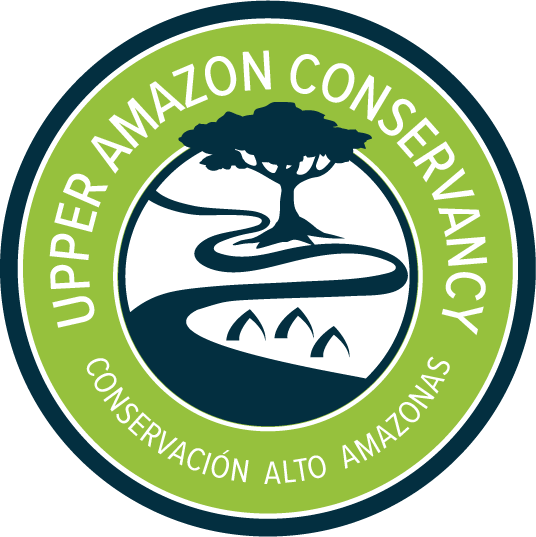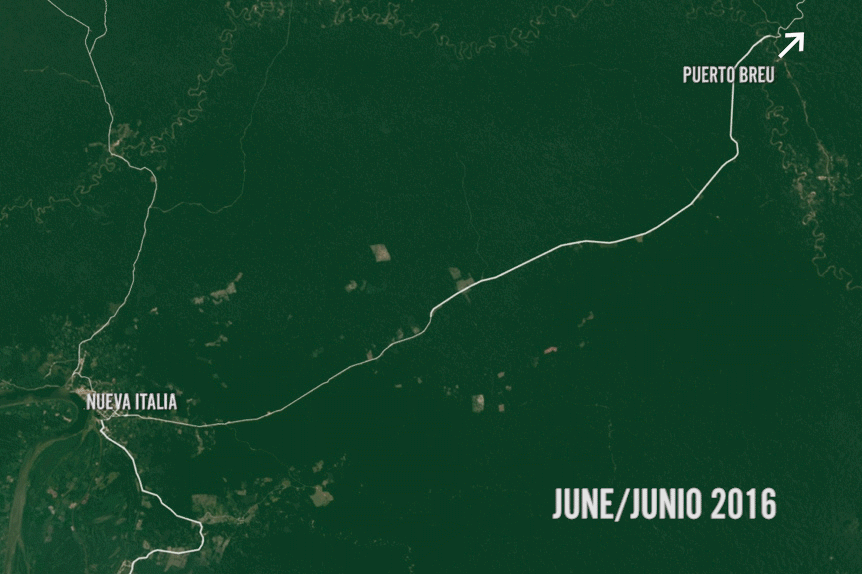Nueva Italia – Puerto Breu, Yurua Road
The remote Yurua region is threatened by construction of an illegal road despite opposition from the local Indigenous tribes. Loggers utilizing tractors and supported by the narco mafia have ignored Peru’s laws related roads and indigenous rights to open the Yurua’s intact forests for logging, coca farming and land trafficking.
Logger—Narco Invasion
In August, four tractors successfully arrived at the Yurua River via the road. The communities responded by traveling several days by boat to confront the loggers and temporarily stop the illegal activities of the tractors. The community of Sawawo filed a lawsuit against the logging company for entering its territory without permission and destroying forest for the road, including areas that the community had reforested with mahogany and other valuable and rare species. Regional authorities from the city of Pucallpa responded with two field investigations, however both investigations were led by logging company lawyers, calling into question the objectivity of the investigation and eventual ruling.
Tractors used in illegally developing the old logging road between Nueva Italia and Puerto Breu.
Land traffickers from the city of Satipo began advertising lands for sale along the road, lands that don’t belong to them, replicating a system of land trafficking being used throughout the Peruvian Amazon to populate remote, lowland areas with coca farmers from Satipo and the Central Forest (Selva Central). This phenomenon—the migration of farmers from the valley of Apurimac, Ene and Mantaro rivers (VRAEM), Peru’s major coca producing region, is occurring in many remote, lowland watersheds in Ucayali. See UAC’s investigation of coca invasions in the nearby Urubamba watershed in late 2019.
The invasions began in 2019, before the road was completed. As of August 2020, there were already at least 6 illegal, clandestine airstrips near the road (click to enlarge).
The Yurua: Intact but Threatened
The Yurua is one of the most remote and intact regions in the Amazon, home to six Indigenous tribes including some of the last voluntarily isolated tribes in the world. If completed, the highway will provide loggers, land speculators, and other outsiders with easy access to Indigenous territories and protected areas including the Alto Purús National Park, the Murunahua Indigenous Reserve for isolated tribes, and the Yurua Communal Conservation Concession. These areas are part of the Purús—Manu Conservation Complex, a massive 25-million-acre (10 million hectare) corridor of protected areas and Indigenous lands that contain some of the most remote and intact forests left anywhere in the Amazon. In October 2021, Mongabay published an expose on threats to Purús—Manu, including an article on the Yurua road
Increased deforestation along the old logging road being improved to connect Nueva Italia to Puerto Breu, Yurua from June 2016 to September 2020, with a dramatic increase since 2019. (Source: 2020, Planet Labs Inc. thanks to the Norwegian International Climate and Forest Initiative, compiled by David Weiss, CEES, WFU).
Indigenous Alliance Formed
In March 2021, UAC helped form an alliance between the Yurua’s three Indigenous organizations to begin organizing and educating local communities on the road. The Alliance is comprised of the Yurua Indigenous federation (ACONADIYSH), the Yurua Communal Conservation Concession, and the environmental association of Dulce Gloria, the region’s largest community. Later that month, UAC led a two-week river trip to each of the Yurua’s 16 communities to enable Alliance members to present information on the road, discuss their concerns, and strategize about demanding that authorities respect their territorial and legal rights. In April, the communities convened for a regional Indigenous congress to develop a position statement to present to authorities.
Emergency Communal Assembly
On September 15th, ACONADIYSH held a second emergency assembly to discuss threats from the road and update their demands to the government. Participants included representatives from all 16 communities, various authorities including representatives from Ucayali’s forestry agency and the environmental prosecutor’s office, both of whom are involved in investigating the road, and representatives from the Brazilian community of Apiwtxa. In the morning, participants presented information on the road, the state of deforestation, and laws related to road building and Indigenous rights. The communities then met privately to draft a document outlining the results of the assembly and their demands, called an Acta. Among the demands are that any future construction is done with their consultation and in compliance with the various laws related to Indigenous rights and environmental protection.
A second emergency indigenous assembly to discuss current threats from the road and draft new demands to the government.
Community Logging Contracts: A Typical Example of Indigenous Exploitation
While the large majority of local people are adamantly opposed to the road, fearing a repeat of the mahogany boom of the 2000’s that left many communities without any mahogany and nothing to show for it, a handful of entrepreneurs have agreements with communities to log. UAC was asked to interpret the details of one contract between the community of Dorado and the logging company Inversiones Forestales JS. The company claims it paid the community a sum in advance. However, as is often the case, this agreement was reached without a communal assembly and participation of all members, many of whom report not knowing anything about a payment.
Several issues of note with the contract:
states that the contract was signed during a communal assembly, but community members claim there was no assembly nor were they consulted.
the community as owners of the trees should receive at least 50% of the profits, however the contract states it will receive 15% of the profits.
prices for different species range from 20 to 50 centavos, or 5 to 13 US cents, per board foot of wood and are fixed for the 20-year period of the contract without the option to adjust for market changes.
Next Steps
UAC is working with ACONADISYH and individual communities to demand that Sawawo receives compensation for damage done by the logging tractors, and that any further construction on the road is done in a legal manner, ensuring that the communities are involved in a thorough consultation process (consulta previa) and in compliance with all environmental and social impact assessments.



